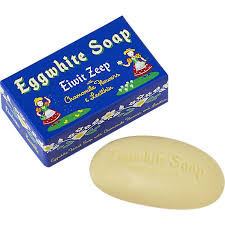What the Cluck?
- Gillian
- Sep 4, 2023
- 3 min read
Trawling the many soap sites on the internet often gives me inspiration to try new and unusual soap techniques. Recently I came across a soap making recipe that replaces some of the water content with eggs. Intrigued, I did a little more research and discovered that egg soap has been gaining popularity in recent years as an alternative to traditional soaps. Its unique properties and long-standing history make it a fascinating choice for anyone seeking a more sustainable option than mass-produced soap (which can often leave skin feeling dry and tight).

Image courtesy of Lovin' Soap Studio and Heavenly Soaps LLC
Eggs have long been celebrated for their nourishing, healthy properties, and they bring these same benefits to soap. Egg yolks are rich in proteins, vitamins, and minerals like vitamin A, B-complex, D and E, as well as calcium, potassium, and magnesium. When combined with other natural ingredients such as Shea butter, olive oil, or coconut oil, some claim these nutrients contribute to the creation of a nourishing and gentle cleansing soap.
The origins of egg soap can be traced back over centuries to the Ancient Egyptians and Greeks who recognized the value of eggs in their beauty routines. Over time, this knowledge spread to other countries and cultures and today, egg soap remains a part of natural skincare traditions, particularly in the Nordic and Scandinavian regions.
So what are the benefits of egg soap? Why is it better than traditional cold process soap?
Fans of egg soap say there are many benefits. They claim the addition of egg makes the lather more creamy when using the soap, they also claim that the proteins and fatty acids present in egg yolks help retain moisture, making it ideal with those with dry or sensitive skin.
Some believe the proteins in eggs can improve elasticity and tighten skin, promoting a more youthful appearance. Egg yolks contain lecithin, which can help control excess oil production and reduce the occurrence of acne breakouts.
It is worth noting that none of these claims have been verified or proven, and in all fairness traditional cold process soap, if made using the appropriate combination of ingredients, can replicate most of these claims. For example, if you need a soap that helps with acne, get one made with tea tree essential oil; have dry or sensitive skin - you probably need an unscented, castile soap which is made with only three ingredients: olive oil, water, sodium hydroxide.
Glycerin, which is naturally present in all handmade soaps, is a humectant - it draws moisture from the air - which can also help your skin retain moisture. The reason store bought soap makes your skin feel dry is because the glycerin is "harvested" during the soap making process and sold to cosmetics companies to be used in other beauty products. Unless you have very sensitive skin, using a traditional cold process soap, even scented varieties, shouldn't leave your skin feeling dry.
It is also worth noting that there is disagreement over whether to include the whole egg, just the yolk or just the white. Some people say the white is why the lather is so rich, others claim the yolk has all the benefits. If that's the case, I say use the whole egg and get all the benefits!!
L-R Whole Egg Soap by Heavenly Soaps LLC, Eggwhite Soap, Egg Yolk Soap
I think the idea of egg soap is a fascinating blend of history, and novelty. From its ancient origins to its potential revival in today's more eco-conscious world, I think it would be a fun option to try out. Although it isn't suitable for vegans (unlike most cold process soap), it is still a cruelty-free option when using ethically sourced eggs, like the ones from my backyard! Right now my girls are not laying (it's too hot and they are just coming into the summer molt) but maybe when I have more eggs than I can eat or give away, I'll whip up a batch of egg soap, just for kicks. In the meantime, have you tried egg soap? Leave me a comment if you have :)









Comments